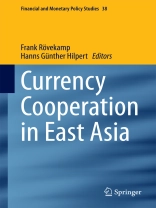This book explores the opportunities and limits of currency cooperation in East Asia. Currency issues play an important role in the region. The Asian crisis of the late 90s was rooted in deficient currency arrangements. The Chinese RMB is not freely convertible yet, but policymakers in China nevertheless aim for a more international role of the Chinese currency. The recent change of direction in Japanese monetary policy caused a drastic depreciation of the Yen and led to warnings against a possible “currency war”, thus demonstrating that currency issues can also easily lead to political frictions. Most trade in and with the East Asian zone on the other hand is still conducted in US $. Against this background different modes of currency cooperation serve the goal of smoothing exchange rate fluctuations and capital flows. They are an important element to promote financial stability and to reduce the transaction cost for foreign trade or investment. The contributions of this book analyze the environment and design of currency cooperation in East Asia and their effects from a macro-and microeconomic viewpoint.
Innehållsförteckning
Frank Rövekamp, Hanns Günther Hilpert: Currency Area East Asia – Cooperation or Confrontation? – Patrick Hess: China’s Financial System: Past Reforms, Future Ambitions and Current State.- Franz Waldenberger: Japan’s New Monetary Policy – Some Critical Questions.- Ulrich Volz: RMB Internationalisation and Currency Cooperation in East Asia.- Kenichi Shimizu: Regional Exchange Rate Management in East Asia – Possibilities and Limits.- Werner Pascha: The Chiang Mai Process as a Case Study of Financial Cooperation in Pacific Asia – Institutional Issues and Experiences.- Andreas Steiner: Reserve Policies of East Asian Central Banks – Causes, Consequences and Prospects.- Jerome Shin: Korea-China Currency Swap-Financed Trade Settlement Facility.- Hans Bleuel: Asian Currency Cooperation and the Potential Microeconomic Effects of Reduced Exchange Rate Fluctuations.- Franziska Schobert, Lijun Yu: The Role of Reserve Requirements – The Case of Contemporary China Compared to Postwar Germany.
Om författaren
Prof. Dr. Frank Rövekamp is professor for Asian Studies with a focus on Japan and director of the East Asia Institute of the Ludwigshafen University of Applied Sciences. Formerly he worked for over 15 years in the industry and held senior management positions in Germany, Japan and Hong Kong. He obtained his Ph D in Business Studies from the University of Cologne. His current research interests include international monetary, currency and trade policy.
Dr. Hanns Günther Hilpert is Senior Associate in the Research Unit Asia at the German Institute for International and Security Affairs (“Stiftung Wissenschaft und Politik”, SWP), Berlin. Formerly he worked for the German Institute for Japanese Studies (DIJ), Tokyo and the Ifo Institute for Economic Research, Munich. He has written and published many books and articles on the Japanese economy and on Asian trade and economic integration. His current research focuses at various policy oriented economic issues of East Asia.












